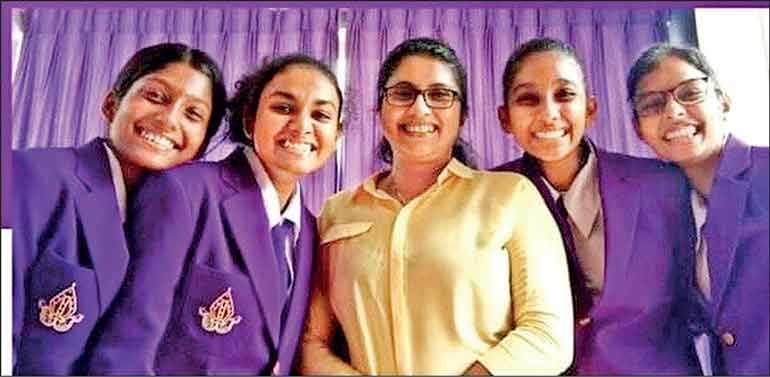Sunday Feb 22, 2026
Sunday Feb 22, 2026
Friday, 21 May 2021 00:00 - - {{hitsCtrl.values.hits}}

The talented all-girl team, ‘Mighty Chondria’ from Bishop’s College, Colombo, were announced the champions of Deakin University’s ‘Young Environmentalists’ Challenge 2021’.
This is the second year that Deakin has hosted this challenging environmental science competition in partnership with Royal Institute Colombo (RIC), one of its institutional partners in Sri Lanka. This year’s competition had a multinational feel to it, with three schools from Vietnam too vying for the honours.
The recently concluded final round of the competition saw the formidable team from Bishop’s College, Colombo emerge as winners, competing in a Live online final against the two other finalist schools from Sri Lanka – the Royal International School, Nugegoda and the Royal International School, Kurunegala and three finalist teams from Vietnam. All six finalist teams emerged from a tough yet exhilarating journey of several months, from the initial rounds through to the final international round, impressing the Deakin academic judging panel with their innovations, including background research, engineering design, data collection, outstanding presentation skills and high-quality scientific understanding of the issue at hand. Deakin University’s Faculty of Science, Engineering and Built Environment (SEBE) launched the competition, ‘Young Environmentalists’ Challenge’ (YEC) in Sri Lanka in 2020 with assistance from RIC, seeking to empower Sri Lankan secondary school students to be the change agents for their futures, by innovating and designing their own solutions to combat Sri Lanka’s growing environmental problems.
The climate change crisis has been highlighted in recent times, by world leaders and even primary-school students, committing to making positive changes for the betterment of the planet. In 2018, Swedish schoolgirl Greta Thunberg (who was only 8 at the time), initiated the movement, ‘Fridays for Future’ (also called ‘School Strike for Climate’), driven by her love of nature and her bravery to stand up for her right to a future. Greta’s actions inspired hundreds of thousands of students from all around the world to participate in their own Fridays for Future, in countries including the United States, Canada, the United Kingdom, Denmark, France, and the Netherlands. Just last year, in the grip of the global pandemic, the revered natural historian, Sir David Attenborough, warned world leaders over an impending environmental crisis. To inspire and incentivise, Sir Attenborough and Prince William of Great Britain have together launched the ‘Earthshot Prize’. With £ 50 million to be awarded over ten years to 50 solutions to the world’s most serious environmental problems, this most significant environmental prize in world history could be certainly be regarded the ‘Nobel Prize for environmentalism’. What is becoming more and more evident, is that no matter which side of the climate change debate the adults are on- whether champions of the environment like Sir Attenborough, or conveniently oblivious like some prominent world leaders, it is up to young people the world over, the future ‘Gretas’ of this generation, to emerge as the crusaders of the future. With what is now known as ‘the Greta Effect’, it is in this apt setting that school children in Sri Lanka too, now have the opportunity to challenge and inspire their peers and wider society to becoming advocates and change-makers for their futures.
YEC2021 saw thirty-eight teams from nineteen schools all over Sri Lanka, participating in the event. Deakin University greatly appreciates the contribution of all students as well as the many teacher mentors for making YEC2021 an immense success.
If you would like to represent your school by participating in YEC2022, please contact the Deakin Sri Lankan Office via [email protected].